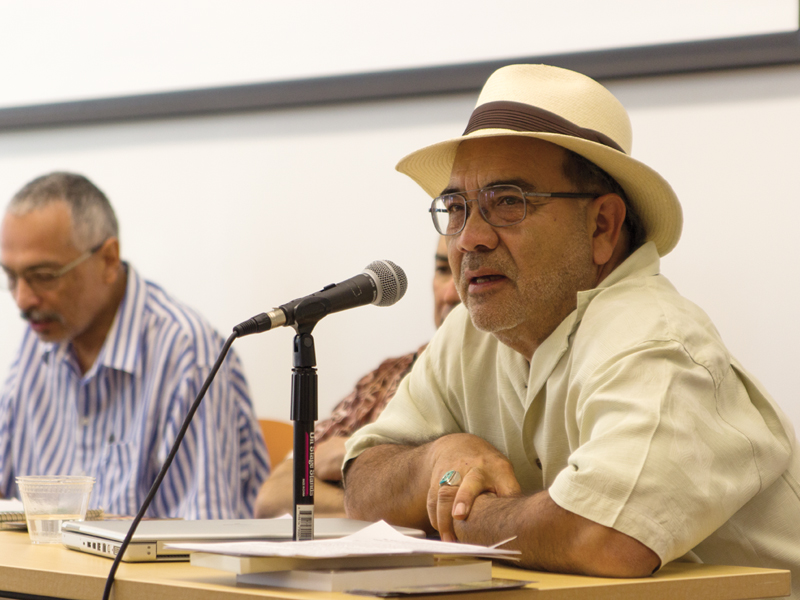
“My protagonists are Chicano because I’m Chicano,” said Mario Acevedo bluntly, author of “Jailbait Zombie,” “There’s also vampires and evil werewolves too but somehow no one ever questions that part.” The audience laughed, instantly endeared to the author’s open honesty and irreverence.
On April 30, the UC Riverside Science Fiction and Technoculture Studies Program featured a panel of prominent authors in the Latino science fiction arena. The panelists consisted of Mario Acevedo, Rudy Garcia, Ernest Hogan, Beatrice Pita and Rosaura Sanchez, who are all authors in the unappreciated field of Latino science fiction. They are writers of novels like “Lunar Braceros,” “High Aztech,” and “The Closet of Discarded Dreams.” These authors all shared a simple goal: to create identifiable Latino characters for young people reading science fiction.
At the event, all the authors seemed eager and surprised to find themselves in such an academic setting. The captivated audience of students belied this humbleness of the authors. The audience was as diverse as the panelists — ranging from young to old, and there was an even representation from varied ethnic groups. The audience’s enthusiasm for science fiction was apparent even in their attire — some wore curved claw earrings and others sported sturdy working boots. They hung off every word the panelists said, catching every science fiction reference and relishing the opportunity to hear these distinctive authors speak.
The panelists were questioned by Sherryl Vint, an English professor specializing in science fiction and technoculture. Despite these official questions, the panelists digressed at their leisure, dispensing writing advice and personal anecdotes. The audience was appreciative of such digressions and seemed to relish the intimate setting of the event.
“Latino science fiction doesn’t want to fit into the world that we live in. A lot of the scenes we see in (television and movies) are too white. Latino science fiction wants to celebrate the multinationalism that has become part of the everyday life,” said Rudy Garcia, author of “The Closet of Discarded Dreams.”
Thus, rather than seeming cloistered into this very specific genre, all of these authors seemed willing to embrace other kinds of writing. They mentioned Octavia Butler and the 1960s Batman series with equal giddiness and admiration. Both the panelists and the audience celebrated these works for their offbeat and niche appeal.
Nevertheless, there was an air of melancholy as the authors spoke of how often their work went unappreciated or, even worse, unpublished. “You have to understand why Ernie talks so much. Ernie came back from the dead,” said Rudy Garcia, gently mocking his friend and fellow author, Ernest Hogan, who had just been ranting on the downfall of chain bookstores. As Garcia explained it, Hogan had a right to be bitter toward the way people buy books. After writing “Cortez on Jupiter,” Hogan apparently sank into such anonymity that his fellow writers assumed he was dead and mentioned him in memoriam in their story anthologies. However, after spotting one such memorial to him, Hogan was bolstered by the support of his fellow writers and bounded back on the literary scene.
The audience created even more of an enriching effect for these undervalued authors. Vickie Vertiz, master’s student of creative writing , assured the panel of authors, “I was at the … Mujeres Activas en Letras y Cambio (Active Women in Letters and Change) Social Convention and we were talking about the Latino Science Fiction community … just to let you know that your work is being discussed in all these literary places.”
There was a tangible give-and-take between the audience and the panelists. The authors mentioned repeatedly that they were not used to having their work discussed in a university environment and emphasized that they wrote purely for entertainment. Yet the audience was insistent in reminding the authors that they were not dead — that far from it, their work was being discussed in academic conventions all throughout the nation and inspiring new authors to bring diversity into the science fiction genre.








